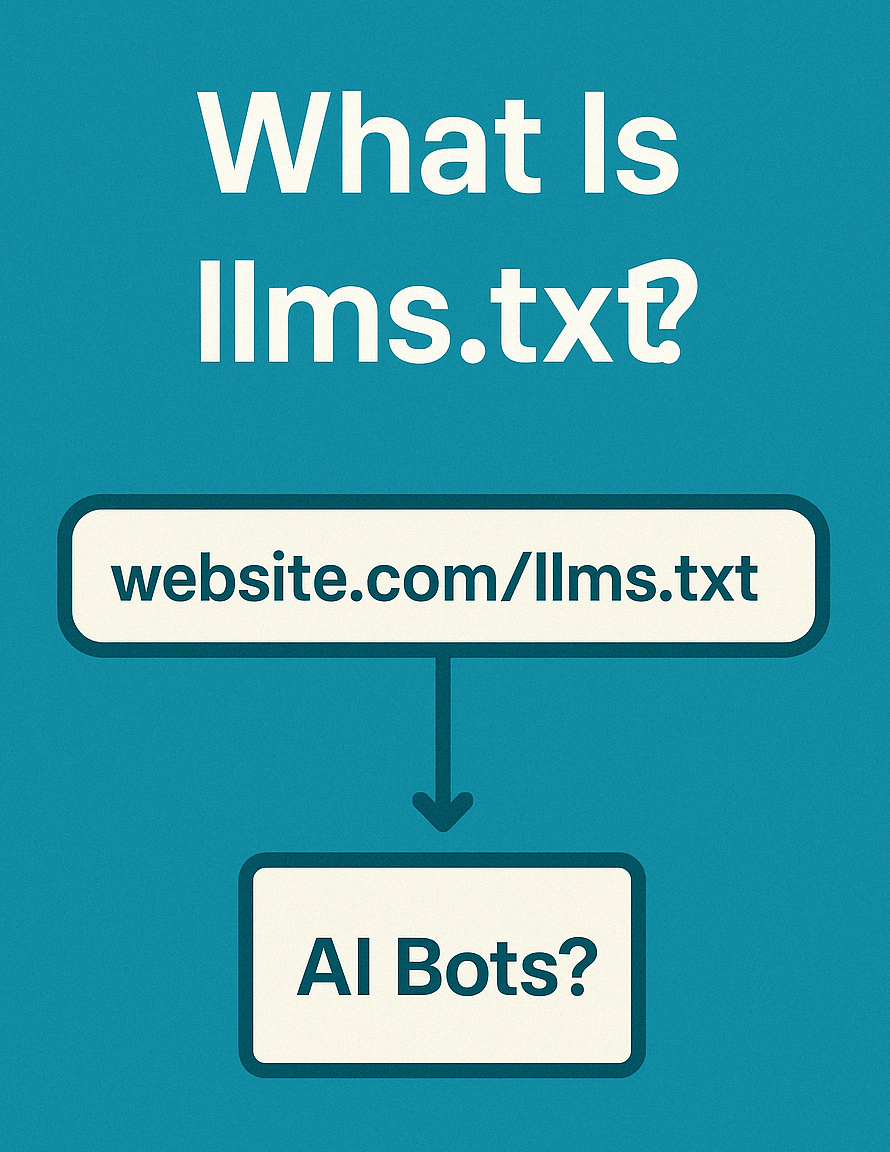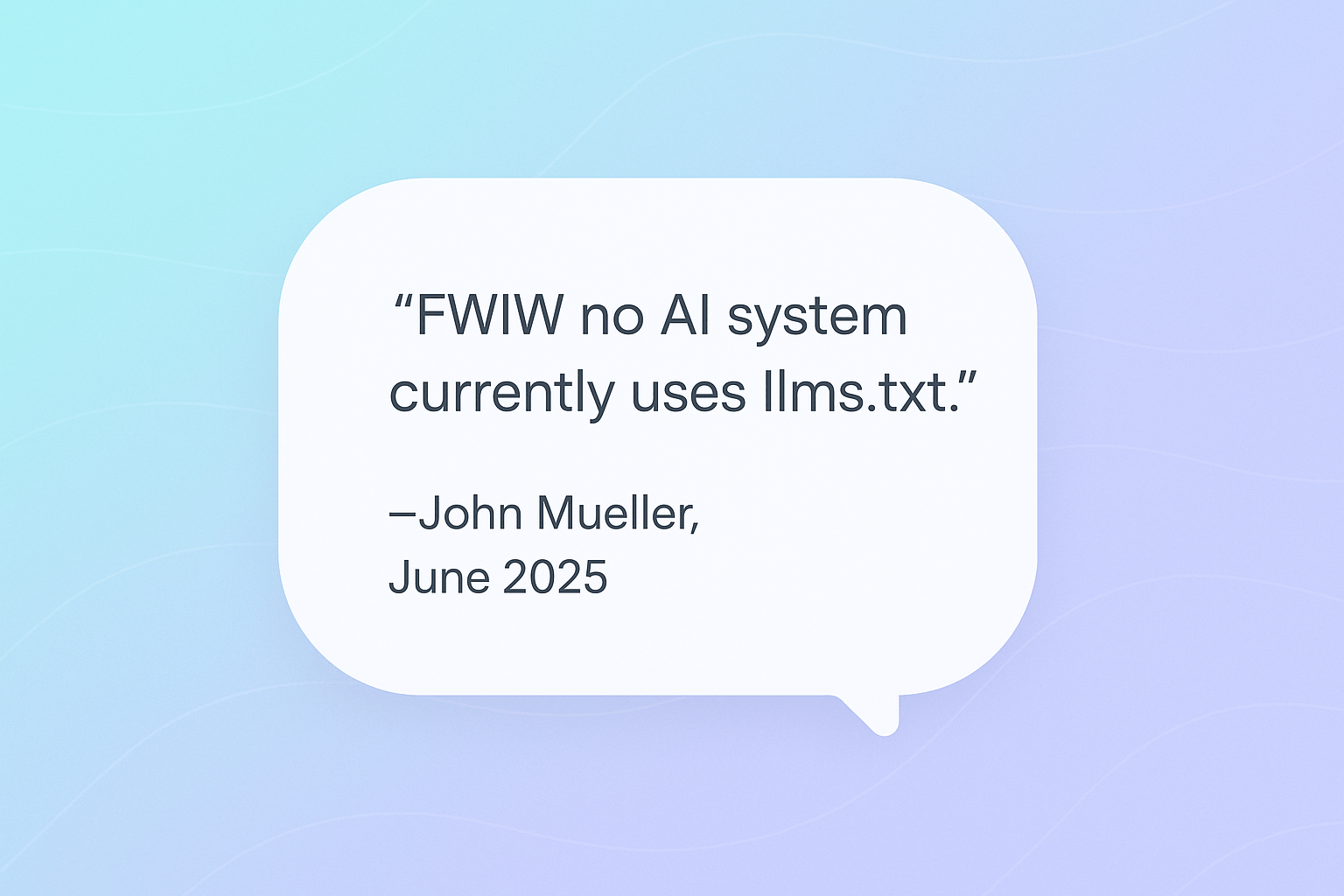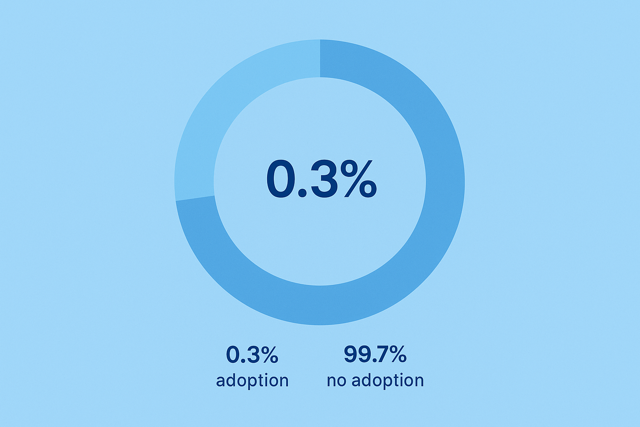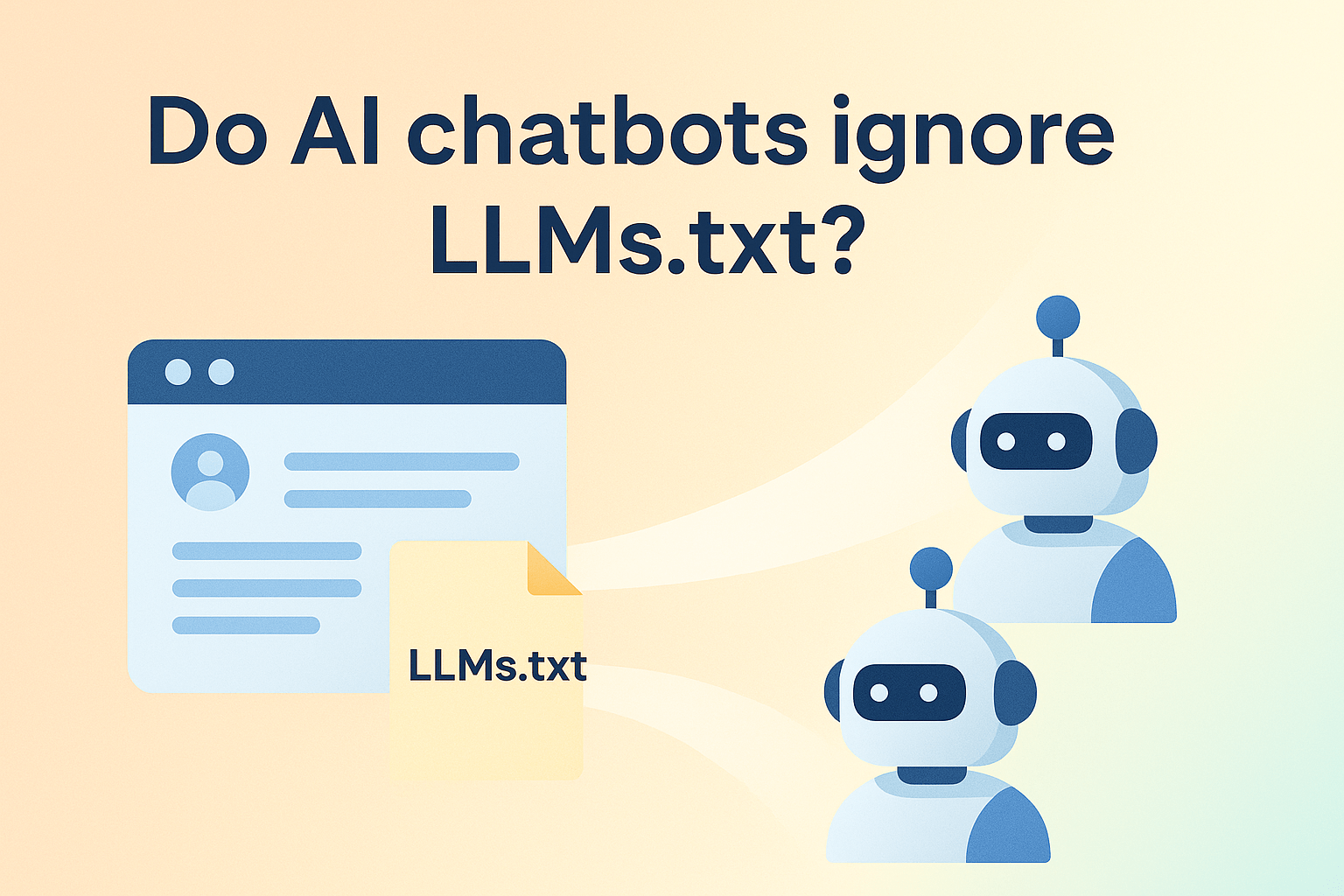Any information contained on this Website is not legal advice and should not be treated as such. You should always contact an attorney for help with your specific legal needs and issues. We may also earn a commission when you click links to our partners and purchase goods or services. For more information, read our Disclaimers Policy.
Over the past year, a small but growing number of SEO blogs and agencies have promoted the idea of adding an llms.txt file to your website. The pitch is simple: place this file at the root of your domain, and it will guide large language models (LLMs) like GPT-4, Claude, or Google’s Gemini toward your most important content. The hope is that your site will be more visible in AI search features, AI assistants, and future generative engines.
It sounds good in theory — who wouldn’t want to control how their site is represented in the AI era? But recent statements from Google employees, as well as real-world server log tests, suggest that adding llms.txt currently has no measurable benefit. Let’s break down why.

What Is llms.txt?
If you’re familiar with robots.txt, the concept will feel familiar. That file tells search engines what they’re allowed to crawl or index [1]. llms.txt is an unofficial proposal meant to do something similar for AI models.
The idea is that by creating an llms.txt file at example.com/llms.txt, site owners could:
- Point models toward authoritative or preferred content.
- Suggest which pages to prioritize for training or citation.
- Potentially improve the way AI tools represent your brand or business.
Unlike robots.txt, however, there’s no formal standard, no agreed-upon enforcement, and—crucially—no major AI vendor has announced support for it [2].
The “Studies” Claiming Benefits
Some agencies and consultants have published case studies or “tests” suggesting that adding llms.txt improved their site’s citations in Perplexity, ChatGPT, or Bing’s Copilot.
The problem is these results are anecdotal and hard to verify. Independent researchers reviewing server logs consistently found that AI crawlers such as GPTBot (OpenAI), ClaudeBot (Anthropic), and PerplexityBot don’t even request llms.txt files [3]. If a bot isn’t fetching the file, then the file can’t possibly influence how your site is represented.
So while early adopters may want to believe they’re seeing a benefit, the data doesn’t support the claim.
What Google Engineers Actually Said
The clearest evidence comes directly from Google employees:
John Mueller (Google Search Advocate) posted in June 2025:
“FWIW no AI system currently uses llms.txt.” [4]
- He emphasized that this is obvious in server logs — if crawlers were checking the file, webmasters would see the requests.
Gary Illyes (Google Engineer) followed up in July 2025, confirming that Google doesn’t crawl or plan to use llms.txt [5].
Together, their statements shut down the idea that llms.txt helps with Google AI Overviews or any other AI-related search features. Google continues to rely on traditional SEO signals, not a separate text file.

Adoption Rates Are Tiny
Beyond Google’s statements, adoption data shows that very few sites are using the file. Independent web scans in mid-2025 found that only about 0.3% of websites included an llms.txt file [6].
For comparison, virtually every serious website includes a robots.txt file. Because adoption of llms.txt is so small, there are no meaningful “network effects” — the ecosystem doesn’t exist for it to matter even if a crawler decided to check.

What Actually Works for AI Visibility
If llms.txt isn’t the answer, what should site owners focus on? Fortunately, the same practices that help with SEO are also the ones AI-powered features lean on:
- Strong Internal Linking
- Helps both search engines and AI crawlers understand your content hierarchy.
- Structured Data & Schema Markup
- Increases your chance of being pulled into rich snippets, knowledge panels, and AI summaries [7].
- Clean Sitemaps
- Ensure all critical pages are discoverable [8].
- Content Clarity
- Write with clear headings, concise explanations, and consistent terminology. Generative systems rely on this clarity to cite or summarize accurately.
- Authoritative Content
- AI Overviews and LLMs lean on well-structured, trusted sources. Building domain authority is still the key.
Google itself has confirmed that normal SEO practices drive visibility in AI Overviews [2].
Should You Add llms.txt Anyway?
Even if llms.txt has no measurable benefit today, some webmasters argue it’s worth adding just in case. Let’s weigh the pros and cons:
Pros
- Low effort: Creating a simple text file takes a few minutes.
- Future-proofing: If vendors adopt it later, you’re already set up.
- Control: Even if ignored now, it documents your preferred content hierarchy.
Cons
- No ROI today: Bots aren’t using it, so there’s no immediate gain.
- False sense of security: Believing
llms.txtwill boost your AI presence may distract you from proven strategies. - Speculative standard: There’s no guarantee any vendor will ever adopt it.
The safe approach: add it if you want, but don’t expect miracles. Treat it as a “future insurance policy,” not an active SEO lever.
How to Add llms.txt in Webflow
If you’re using Webflow, adding an llms.txt file is quick:
- Open Site Settings → SEO → LLMS.txt.
- Upload a plain-text file named
llms.txt. - Publish your site — the file will now be available at
yourdomain.com/llms.txt.
That’s it. No coding required. But remember: as of now, no major AI system reads this file, so the effort is only precautionary. Your time is better spent tightening SEO and structured content.
Practical Recommendations
- Check Your Server Logs
- See if any bots are requesting
llms.txt. If not, you know it’s irrelevant today.
- See if any bots are requesting
- Monitor AI Citations
- Track how often your site appears in Perplexity, Copilot, or ChatGPT references. Compare before vs. after adding
llms.txt.
- Track how often your site appears in Perplexity, Copilot, or ChatGPT references. Compare before vs. after adding
- Prioritize SEO Basics
- Keep building high-quality, crawlable, structured content. That’s what both search engines and AI models currently respect.
- Stay Informed
- If OpenAI, Anthropic, or Google ever announce support for
llms.txt, that will be the time to double down. Until then, it’s speculative.
- If OpenAI, Anthropic, or Google ever announce support for
Conclusion
The hype around llms.txt shows how hungry the SEO community is for control in the AI era. But the reality is simpler: no major AI system uses llms.txt today. Google engineers have confirmed it, and server logs back it up.
Adding the file won’t hurt your site — it’s quick and harmless — but it won’t help either. The smart move is to double down on the fundamentals that do work: solid technical SEO, high-quality content, and structured data. Those are the signals that search engines and AI systems alike continue to reward.
So the next time you hear someone say llms.txt will make your site “AI-ready,” take it with a grain of salt. For now, the best strategy is the same as it’s always been: focus on clarity, accessibility, and authority.
💬 Have questions about AI SEO or Webflow?
I’m always happy to answer. Feel free to contact us if you want practical help applying these ideas to your own site.
References
[1] Google Search Central: Robots.txt
[2] Search Engine Journal: John Mueller on llms.txt
[3] Danyal Ali on X: AI bots ignoring llms.txt
[4] John Mueller on X: “No AI system uses llms.txt”
[5] Search Engine Roundtable: Gary Illyes on llms.txt
[6] SEO Clarity Report: Adoption of llms.txt

.jpg)